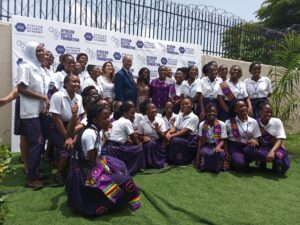Chair and founder of the African Gifted Foundation, Dr. Tom Ilube CBE – who doubles as founder of the African Science Academy (ASA), has encouraged women across Africa to immerse themselves in science and technology.
To him, they should pursue careers in science and technology because they are the future. He explained that science, technology, engineering and mathematics (STEM) education holds the potential to transform lives, the economy and entire African continent.
Dr. Ilube made this call in an interview with B&FT during the inauguration of a new building for the African Science Academy in Tema.
He said the new building will help expand the school and enable about 50 students to receive full scholarship packages every year. He further said the African Science Academy – established six years ago with over 100 students – is beginning stage-two of its journey.
“This is indeed a launch-pad for our vision in science and technology for young African women. It is so important. When students come to African Science Academy, we give them world-class education and provide them with everything,” Dr. Ilube said.
He indicated that, as a private initiative, his outfit gets funding from private firms and individuals in Africa and all over the world. “People who really believe in the power and potential of African women for science and technology help cover their fees, bursaries, travel costs. We give them computers and then we help them to apply to universities all over the world”.
Executive Director of African Gifted Foundation, Yasameen Al-jboury, observed that there is so much already happening in Ghana and across Africa as a whole in the science, technology and innovation space.
In the next five years, she is predicting an explosion in STEM due to its growing importance and its roles in addressing climate change concerns and the increasing use of artificial intelligence and robotics.
“African Science Academy is to seek and find African gifted girls across the continent to be at the forefront of some of these innovations, to get the foundations they need to lead some of these developments, and get the support and the professional experience they need to come back and make a difference through science, technology and innovation,” said the Executive Director of African Gifted Foundation.

Madam Al-Jboury emphasised that: “I think STEM is the way that Africa will develop and address some of the issues it is facing. I think it is important that we all recognise this at government level, as non-profit and private sector. We need to invest in education if we want to make that happen. The challenge is that we have a young population, but we really need to invest in them if we want to make a difference”.
Headteacher at African Science Academy, Gifted Ghansah, also urged African girls not to have a fear of mathematics and to always go outside their comfort zone, think outside the box, push themselves forward and seize opportunities within the STEM space.
“STEM is not just about going through engineering and all that; I think STEM is all over us, and I want people to begin to think about it in that way,” she said.
She also called on parents to consider giving their daughters a chance to explore the opportunities within the areas of STEM, while teachers should find innovative ways to make mathematics and science subjects more interactive and enjoyable for students.
She revealed that this year the school has 40 girls coming from 12 different African countries.
The class of 2022 prefect of African Science Academy, Yvett Ahishakiye – a Rwandan who is currently at Ashesi University, said the school prepared her for the future both academically and socially, adding that: “At A.S.A, I was well-equipped; it helps me integrate in terms of academics and social skills coming together with people from different nationalities”.
Ruth Arhin, the current Head Girl of African Science Academy said: “When I was coming to ASA I thought I knew most of the mathematics and physics concepts, but ASA proved me wrong. ASA has broadened my knowledge in physics and made me more curious in terms of problem-solving.
“I basically look for problems and try to create solutions for them. It has introduced me to a more diverse community; although I am in Ghana, I feel I have gone to almost all the African countries,” she said.










